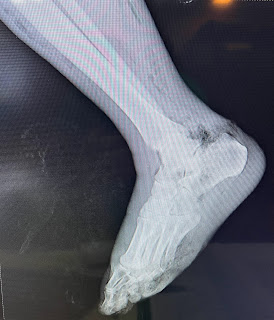There is Freedom and Beauty in Incompleteness
...We cannot do everything,
and there is a sense of liberation in realizing that.
This enables us to do something,
and to do it very well.
It may be incomplete, but it is a beginning, a step along the way,
an opportunity for the Lord's grace to enter and do the rest.
We may never see the end results,
but that is the difference between the master builder and the worker.
We are workers, not master builders;
ministers, not messiahs.
We are prophets of a future that is not our own.
~ An excerpt from A Prayer of St. Oscar Romero
There have been many times during my journey in medicine when I have experienced helplessness in the inability to provide complete healing or care for another person. In dwelling on these experiences, I have inevitably conjured up a multitude of reasons for this incompleteness: time and financial constraints of the healthcare system, my own lack of knowledge and experience, the lack of motivation from the patient him- or herself, or the inherent limits of our medical treatments and capabilities to support life. I think anyone in the healthcare profession can attest to the constant plague of these realities: lack of resources (or at times, even having too much to offer), the business- and customer service-oriented aspect of healthcare, and the dreaded "imposter syndrome" to name a few.
Though one can surely "find liberation in not being able to do everything" in developed nations, it's even more evident in developing countries where the intangible ceilings on the care you can provide are lower, and hence easier and quicker to reach.
This ceiling differential of inequity was most evident to me this past week when a mother gave birth to twins at 25 weeks gestation. In the United States and other developed countries these precious lives would have about an 80% chance of survival after months of intensive care and hundreds of thousands if not millions of dollars. Here, their chance of survival is effectively 0% and no one knows what hundreds of thousands or millions of dollars looks like. In perhaps the most difficult human experience of watching one's children die, I witnessed something truly beautiful and life-giving. I observed the midwife compassionately console and pray with the mother and father as they each held a dying daughter in their arms. She placed a warm beanie on each child's head and indelibly marked their footprints using ink and paper. Through tear-stained eyes, each parent could see their baby girls tiredly but heroically breathing and their hearts slowly but fruitfully beating, almost visible through their thin, semi-translucent skin. Their children would leave this earthly world remembering being held, even for just a moment, by their parents in a dignified act of love.
And though one could choose to see the provision of care for these twins as incomplete, one can also choose to see the care provided to them through a different lens: a lens gifted by God that opens one's vision to something truly beautiful. Reflecting the words in A Prayer of St. Oscar Romero, the midwife had done something, and she had done it well. She had walked compassionately with parents going through immense suffering. In the end, the midwife caring for this couple and their children, paved the way for God's grace to work in this couple's lives and our lives as well as witnesses to this experience of human suffering.
On this same day, I received a timely message in my inbox which helped me see this experience through God's lens. Pope Francis spoke earlier that day, “As we know from many encounters of Jesus in the Gospels, faith is born from the compassionate gaze with which God looks at us, melting the hardness of our heart, healing his wounds, giving us new eyes to see ourselves and the world.”
I am reminded that we are not master builders, but rather workers. Ultimately, we do not have control of a future that does not belong to us; instead, in whatever circumstances life presents to us, we can choose to do something, and do it well, even when it is incomplete.
On a "lighter note", I encountered some locals working to "lighten" their loads while I was strolling along the beach the other day. First, there was a young man hauling six wooden two-by-fours tied together by a rope through the shallow part of the ocean. He told me that it was easier to move them by tugging them as they floated in the ocean water rather than lifting them on his back and walking with them for more than a quarter-mile. Then, I saw a make-shift raft with what appeared to be more than a hundred empty, capped one-liter soda bottles coating every inch of the wooden raft to keep it afloat. Though as a physician I cannot endorse routine consumption of soda, I applaud the creativity and resourcefulness of using soda bottles for transportation!
I am excited to continue sharing my journey with you, and I continue to thank you for your thoughts and prayers.




Zachary, I enjoying reading your blogs every Sunday. Some make me feel sad. But some of your other writings, make me thank God for all the blessings from him and for my family, able to work and live in comfort and not being hungry. God Is great 🙏 Thank you for letting me read your stories. Take care in your journey over there and stay safe. Love always Aunt Renie Saucedo💜
ReplyDelete